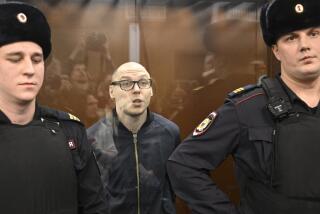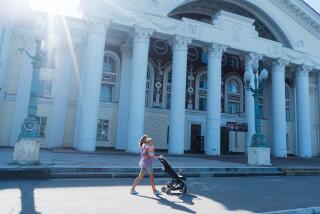Recognition Comes Late for Soviet Poet
MOSCOW — When Vladimir Vysotsky was alive, his songs and poems were officially unacceptable. Today--eight years after his death--he is almost a cult figure, with government ministries stumbling over one another in their eagerness to issue his records, publish his works and even set up a museum to honor his memory.
Vysotsky’s anti-Establishment work was always admired by a sizable segment of Soviets, and tens of thousands of Muscovites stood for hours this week in near-zero weather to pay their respects to him on the 50th anniversary of his birth.
They waited for as long as three hours in a slow-moving line that wound past Vysotsky’s grave in Vagankovskoye cemetery. Thousands more gathered around the apartment he occupied before his death in 1980 at the age of 42.
A gold-toothed woman who stood near his grave explained why she had come to place carnations beneath the gold-colored bust of Vysotsky on a cold winter day.
“He said things that other people thought but were afraid to say,” she told a reporter.
In the mile-long line outside the cemetery, Vysotsky’s fans argued about whether he should be ranked with such famous Russian poets as Alexander Pushkin and Mikhail Lermontov.
“Anyway, no one would stand for hours in freezing cold for (Andrei) Voznesensky or (Yevgeny) Yevtushenko,” one man said, mentioning two of the best-known contemporary Soviet poets.
Vysotsky’s best-loved works focus on the harshness of Soviet life, injustice, the misery of prison camps and favors for the elite at the expense of the masses. Long before the policy of greater openness was advanced by Soviet leader Mikhail S. Gorbachev, Vysotsky discussed repression in psychiatric hospitals, anti-Semitism, drunkenness and the heavy hand of the state on ordinary people. He used everyday language, slang and even vulgar expressions to deliver his message.
“He was our conscience,” a gray-haired woman in line at the cemetery said. “He was a true people’s poet.”
‘Ideological Subversion’
At a Sunday evening show in Vysotsky’s honor in the Palace of Sports, Voznesensky noted that the artist was never allowed to appear in a concert there. The palace is the largest indoor site of its kind in Moscow, with a capacity of 12,000, and it is normally used for hockey games.
Instead, he was limited to the smallest halls, and organizers of Vysotsky’s performances were often harassed by the police and accused of promoting “ideological subversion.”
At the Sports Palace this week, however, Vysotsky was treated as a figure larger than life, even in death. A large photograph of him stood to one side of the stage, spotlights illuminating his face. Flowers--mainly red carnations--were piled in a huge mound.
For some of Vysotsky’s admirers, the frenzy of the recent hero worship of him is a bit too much.
Natalia Krymova, writing in the weekly Moscow News, said that people responded to Vysotsky’s demand for democracy and glasnost, or openness, “long before the critics, intellectuals or politicians did.” Therefore, she suggested, it was ironic to see prominent people scrambling to pay 10 rubles (about $17) for tickets to his 50th birthday show in Moscow’s largest concert hall.
If Vysotsky could appear with his guitar, she speculated, he might afflict the comfortable and comfort the afflicted as he once did.
“He would make us understand who thought what about perestroika (Gorbachev’s policy of restructuring),” she wrote. “We would learn what the driver, the writer, the minister and the soldier thought about it all . . . and who clung to his office chair and did not give a damn about anything else.
“It would suddenly become clear to us that demagoguery and hypocrisy are still flourishing. It’s good we have had Vysotsky . . . but, oh, how we miss him today.”
More to Read
Sign up for Essential California
The most important California stories and recommendations in your inbox every morning.
You may occasionally receive promotional content from the Los Angeles Times.










